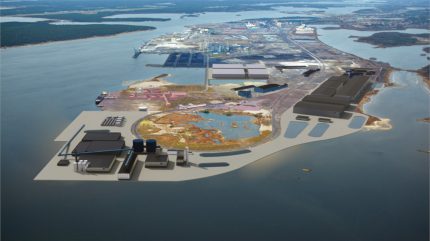
Swedish mining company LKAB has filed an environmental permit application for a new industrial park in Luleå, Sweden, with the potential to significantly enhance Europe’s self-sufficiency in critical minerals.
The park is set to produce phosphorus and rare earth elements, essential for agriculture and the technology sector.

Discover B2B Marketing That Performs
Combine business intelligence and editorial excellence to reach engaged professionals across 36 leading media platforms.
It is estimated that the park’s output will meet seven times Sweden’s annual phosphorus needs and 8% of the EU’s demand once operational.
The application, filed with the Land and Environmental Court, outlines plans for large-scale industrial operations and port operations on Svartön in Luleå.
The proposed park will process apatite concentrate transported from LKAB’s iron ore production in Gällivare, utilising waste streams from the mining process.
Gypsum, a by-product, will also be produced for the construction industry. The park is expected to be operational by the end of 2026, with full-scale operations envisaged for the 2030s.

US Tariffs are shifting - will you react or anticipate?
Don’t let policy changes catch you off guard. Stay proactive with real-time data and expert analysis.
By GlobalDataOn 24 October 2024, LKAB announced an investment of Skr800m ($72.41m) to establish a Demonstration facility in Luleå, which will test and verify the processes required to produce these critical minerals.
The outcomes from this plant, along with the environmental permit for the industrial park, will inform future decisions on scaling up production. These decisions are contingent on the environmental permit for LKAB’s operations and apatite plant in Gällivare, which is under review.
The application has been in development for four years and addresses the environmental impact of the planned operations, including resource usage, emissions, local transport, noise, and chemical handling risks.
It also considers the impact on water and land environments, proposing new quay construction and land reclamation to expand the production area.
Public consultations were held in 2022, with additional consultations in 2023 and 2024. LKAB has proposed that the main hearing take place at the end of May 2026, with a court decision expected during or after mid-2026.
The EU has classified both phosphorus and rare earth elements as critical raw materials due to their essential role in the economy and the green transition, as well as the high risk of supply disruptions.
LKAB’s application aims to designate the Gällivare mine, the Luleå industrial park, and the new Per Geijer iron ore deposit in Kiruna as Strategic Projects under the EU’s Critical Raw Materials Act.
LKAB Business Area Special Products senior vice president Darren Wilson said: “The geopolitical situation and Sweden’s goal of achieving net-zero emissions by 2045 make the need for critical minerals urgent. The EU is today entirely dependent on imports of phosphorus and rare earth elements, which it classifies as critical raw materials. This application is crucial for enabling a future investment decision for full-scale production in Luleå.”
Luleå Municipality Board chair Carina Sammeli said: “LKAB’s environmental permit application is another step towards the development of the full-scale industrial park in Luleå. It is encouraging to see them move forward according to their plan with this establishment, which is important for the continued development of both the municipality and the region as a hub for the green transition.”
The production of these critical minerals for wind turbines, electric vehicles, and food security is essential for our entire society and provides an opportunity to create new jobs for the future.”





